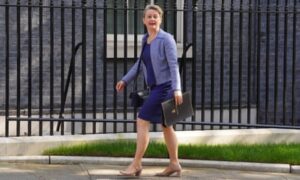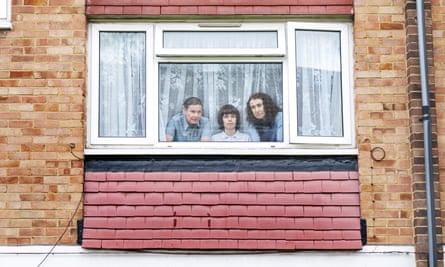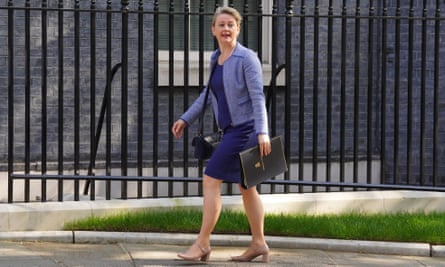
The Conservative party leader wote:
After last year’s historic defeat, and with protest votes cutting across every ballot box, we knew Thursday would be hard. I’m deeply sorry to see so many capable, hard-working Conservative councillors lose their seats. They didn’t deserve it – and they weren’t the reason we lost.
In the piece, Badenoch explained that as party members were voting in the final round of the Conservative party leadership contest, an unnamed male MP took her aside in parliament and warned “the May 2025 locals are going to be a total bloodbath”. She acknowledged that the prediction was right: “The results confirm he was correct. But to be honest, it wasn’t a controversial prediction to make.”
She added:
These local election results show the scale of the work needed to rebuild trust in the Conservative party and the importance of redoubling our efforts to show that this party is under new leadership and is doing things differently.
here.
Below is a summary from today’s live blog:
-
Kemi Badenoch has apologised for the “bloodbath” of the local elections in an op-ed piece on Saturday for the Telegraph. The Conservative party leader wrote: “I’m deeply sorry to see so many capable, hard-working Conservative councillors lose their seats. They didn’t deserve it – and they weren’t the reason we lost.” She added that the local election results had shown “the scale of the work needed to rebuild trust in the Conservative party”.
-
Reform UK will find out there are “no simple answers” to local public finances and have to make “difficult choices” after the party surged in local elections, a senior Tory MP said. Speaking to GB News, Richard Fuller, shadow chief treasury secretary, said it was now up to Nigel Farage’s party to see if they could deliver in the areas where they had won council seats and mayoral polls.
-
Keir Starmer has said he wants “national renewal” and that “change on that scale will take time”, in a Saturday op-ed for the Times. The prime minister insisted there was “tangible proof that things are finally beginning to go in the right direction”, although he said he was not satisfied with where the country was. Starmer said he was “acutely aware that people aren’t yet feeling the benefits”.
-
Nigel Farage hailed his party’s “unprecedented” results in the local elections. In a post on X on Saturday, the Reform UK leader wrote: “In postwar Britain, no one has ever beaten both Labour and the Tories in a local election before. These results are unprecedented.”
-
Labour MP Rachael Maskell has urged her party to scrap winter fuel and welfare policies that she said are pushing voters away. Maskell suggested that voters shunned her party in local elections because it had failed to live up to the values the public expects from a Labour government. The York Central MP told BBC Breakfast: “People went cold last winter and that’s not what a Labour government should be doing.”
-
Assisted dying is about the “human cost” and not pounds and pence, Kim Leadbeater, the Labour MP behind the bill, told BBC Radio 4’s Today programme. An impact assessment into the terminally ill adults (end of life) bill was published on Friday, exactly a fortnight before the next Commons debate on the proposed new law. It set out estimates for how many people might apply and go on to have an assisted death, as well as potential costs of the service and reduced end-of-life care costs. Leadbeater said the bill would provide the “most robust piece of legislation in this area in the world”.
-
The MSP behind the bill to legalise assisted dying is dropping proposals to allow 16 and 17-year-olds to end their lives with medical assistance. Liam McArthur said he would raise the minimum age in the assisted dying for terminally ill adults (Scotland) bill to 18.
-
Shadow chief treasury secretary Richard Fuller insisted Kemi Badenoch would still be the party’s leader in a year’s time after the Conservatives lost more than 600 councillors in local elections. Speaking on BBC Radio 4’s Today programme, Fuller also ruled out a future pact with Reform UK on a national level.
-
Keir Starmer congratulated Australian prime minister Anthony Albanese on his election victory on Saturday. In a statement shared on X, Starmer said: “Congratulations to Anthony Albanese on your election win. The UK and Australia are as close as ever – which goes to show that long-distance friendships can be the strongest.”
-
A newly elected Reform UK councillor said Durham county council would be “getting the auditors in” right away to slash spending in areas like net zero and green initiatives. “We’re getting the auditors in to see … actually what those jobs are, and if they’re good value for money, and if they’re not, well, the answer is, ‘Yeah, goodbye’,” Darren Grimes, a Durham councillor and former GB News presenter told the BBC’s Today programme. It followed comments made yesterday by Farage in which he warned council staff working on diversity or climate change initiatives to seek “alternative careers”.
-
Ed Davey said that the Conservatives were “on their last innings”, as he joined Wiltshire Lib Dem group leader councillor Ian Thorn, local councillors and campaigners at the Harnham recreation ground in Salisbury to play cricket. The Lib Dem leader was celebrating his party becoming the largest on Wiltshire council in the local elections.
-
The cramped conditions of Victorian prisons in England and Wales are limiting the rehabilitation opportunities for thousands of offenders, an official watchdog has said. As the Guardian launches a visual investigation into the state of Victorian prisons in inner cities and towns, the chief inspector of prisons, Charlie Taylor, said 19th century jails could also be “incredibly noisy and distressing” for autistic people.
-
Football matches and concerts have better security than some jails, the national chair of the Prison Officers’ Association (POA) told the Times. Staff who are faced with inmates obtaining illicit items have to deal with prison bosses who are “not up for the fight”, Mark Fairhurst said. Overcrowding and violence were among his key concerns, he said.
-
Headteachers are taking legal action against Ofsted, England’s schools watchdog, over fears that its new inspection regime is “even worse than before” and likely to harm the mental health of school leaders. The National Association of Head Teachers said it had lodged a claim for a judicial review against Ofsted “over the potential impact of their inspection proposals” and for inadequate consultation over its new system of grading schools.
-
A Syrian grandmother who is dying of cancer has been given permission to come to the UK to spend her final days with the grandchildren she has never met, after a Home Office U-turn. The government had wanted to bar Soaad Al Shawa, who has liver cancer and has been given just weeks to live by doctors, from travelling to spend her last days with her daughter Ola Al Hamwi, son-in-law Mostafa Amonajid and their three children aged seven, five and one. Al Shawa has only been able to communicate with her grandchildren on video calls.
Labour minister for faith, to reject a further six months of funding from the government, citing a strained relationship with his department and the stress caused to staff by “malicious campaigns” some of which “emanated from individuals and organisations” chasing the funding that Tell Mama has enjoyed.
It means that, at a time of soaring bigotry, there is now no government-funded group carrying out anti-Muslim hate monitoring in the UK and this is expected to be the case into the summer.
Atta said Tell Mama would continue to do its work and look for funds from elsewhere but it fully expects to pare back its services.
Labour from 2015 to 2020.
The response from Labour spokespeople so far to the loss of Runcorn and Helsby – and to the election results as a whole – has been especially tin-eared. There doesn’t seem to be any understanding of the deep-seated emotion in the reaction of Labour supporters to the party’s behaviour in government over the past 10 months. There used to be talk of the need for emotional literacy in politics. What we are witnessing is a staggering level of emotional illiteracy.
Labour supporters feel deeply that their party has turned its back on them. It’s not just that they feel they are not being listened to. It’s that the Starmer and Reeves government is doing things that they believe no Labour government should ever do.
After 14 years of enduring year after year of austerity under the Conservatives, there was such a collective sigh of relief in getting rid of the incompetent, corrupt and brutal Tories. There might not have been much in the way of inspiring politics from Keir Starmer in the run-up to the election last July, but at least we had a Labour government.
The problem now is that, at times, the government is unrecognisable as a Labour government. This isn’t the traditional argument about whether the Starmer administration is behaving like old Labour or New Labour. It’s whether it’s Labour at all in the eyes of people who have supported us or would want to support us.
Peter Walker has a handy summary for you:
Kim Leadbeater said those behind the assisted dying bill for England and Wales are “checking for coercion at every level of this process”, reports the PA news agency.
The bill has undergone significant changes since it succeeded in an initial vote in the Commons in November. The high court safeguard has been dropped and replaced by expert panels, while the implementation period has been doubled to a maximum of four years for an assisted dying service to be in place, should the bill pass into law.
The proposed legislation would allow terminally ill adults in England and Wales, with fewer than six months to live, to apply for an assisted death, subject to approval by two doctors and a panel featuring a social worker, senior legal figure and psychiatrist.
The impact assessment published on Friday said the total number of assisted deaths is estimated to range from between 164 and 787 in the first year of the service to between 1,042 and 4,559 in year 10.
The establishment of a voluntary assisted dying commissioner and three-member expert panels would cost an estimated average of between £10.9m to £13.6m per year, the document said. But it said it had “not been possible” to estimate the overall implementation costs at this stage of the process, which could include IT, recruitment and training and could begin to kick in within 12 months of the bill getting royal assent.
MPs will gather for a debate on 16 May in the House of Commons for the bill’s report stage, during which members are expected to vote on further amendments. If time allows on that date, MPs could also vote on whether to approve the bill at third reading – its final stage in the Commons – and decide if it is then sent to the House of Lords for further scrutiny.
Voting is according to conscience, so MPs do not vote along party lines, and the government has said it is remaining neutral as a whole.
Health secretary Wes Streeting, who confirmed last month that he still plans to oppose the bill at the next vote, said last year that there were “choices and trade-offs”, adding “any new service comes at the expense of other competing pressures and priorities”.
It has been suggested some MPs who supported the bill last year could change their stance when it returns for a further vote, after the change to the high court safeguard.
Leadbeater did not concede that support for her bill was cooling, reports the PA news agency.
She said:
I’m actually having conversations with colleagues who voted against at second reading, and are now considering the new legislation that they’ll be presented, and thinking about potentially voting for this because of the additional safeguards that have been added. But it’s absolutely right that all colleagues are taking this extremely seriously.
Kim Leadbeater has said her assisted dying bill for England and Wales would provide the “most robust piece of legislation in this area in the world”. She added:
And that does come with a cost of setting it up, but also we know that there would be savings associated with having this model in place as well.
An impact assessment into the terminally ill adults (end of life) bill was published on Friday, exactly a fortnight before the next Commons debate on the proposed new law.
The assessment estimated that assisted dying could cut end-of-life care costs by as much as an estimated £10m in the first year and almost £60m after 10 years. It noted that reducing those costs “is not stated as an objective of the policy” but some have expressed concerns that this could put pressure on people to end their lives, reports the PA news agency.
Katherine Sleeman, a palliative care professor at King’s College, said the numbers are not a “precise prediction” of what will happen.
Speaking to the BBC’s Today programme, Sleeman said:
Of course, legalisation of assisted dying could lead to cost savings … because costs of care in the last months of life in particular are very, very high. And obviously, if someone isn’t living those last months of life, then costs will be lower.
But in terms of the precise figures, I think we just need to be aware that they are estimates and come with a range around them.
Dr Gordon Macdonald, chief executive of Care Not Killing – which is opposed to a change in the law, said the document “confirms that changing the law will save money … exactly as we have seen in other jurisdictions which have introduced state assisted killing, placing pressure on vulnerable terminally ill people to end their lives”.
Bishop of London, Dame Sarah Mullally, said it was “chilling reading” and said any change in the law that would put vulnerable people at risk rather than working to improve access to palliative care must be opposed.
She said:
It is crude to see these cost savings set out in this way, and it is easy to see how numbers of this nature could contribute to someone feeling that they should pursue an assisted death rather than receive care.
Each human life is immeasurably more valuable than the money that may be saved through their premature death.
The MSP behind the bill to legalise assisted dying is dropping proposals to allow 16 and 17-year-olds to end their lives with medical assistance, reports the PA news agency.
Liam McArthur said he would raise the minimum age in the assisted dying for terminally ill adults (Scotland) bill to 18.
If it becomes law, it would give people at the advanced stage of a terminal illness the option of requesting help to end their life. As it stands, the bill would apply to those who are 16 years old or older and who have been resident in Scotland for at least a year.
However, McArthur has now said he would raise the minimum age requirement. He said:
I’ve considered this matter very carefully and reflected on both the evidence provided to the health committee and assisted dying legislation in place in other countries.
In other jurisdictions that have changed the law to allow dying people access to the choice of an assisted death, such as the US, Australia and New Zealand, 18 is the age from which terminally-ill adults become eligible.
On balance, I now feel that this would be most appropriate for Scotland.
I anticipate this being presented to my parliamentary colleagues at stage two and urge them to vote in favour of the general principles of the bill so we can begin the important work of refining the bill and making sure it’s the most compassionate, safe and suitable law for Scotland. Our dying people deserve no less.
First minister John Swinney said last year the age threshold of 16 was a “very significant issue in my mind” that would have to be “wrestled with”.
MSPs will vote on the bill on Tuesday 13 May. It will be the third time Holyrood has voted on whether assisted dying should be introduced, with previous bids to change the law having fallen at the first hurdle.
Similar legislation to legalise assisted dying in England and Wales is also being voted on by MPs at Westminster.
Last week, Holyrood’s health committee took a neutral stance over whether MSPs should vote for the general principles of the bill. However, it did say parts of the legislation would need“ further consideration” if the proposals pass and ultimately become law, reports the PA news agency.
“These include issues around human rights, coercion, eligibility criteria, provision of assistance, self-administration and conscientious objection for healthcare workers,” health committee convener Clare Haughey said.
In their report, MSPs said “safeguards” in the bill could be “strengthened” with independent oversight, such as by an independent review panel or by giving the chief medical officer a monitoring role.
Care Not Killing, a campaign group against the bill, said the “scrutiny process of the bill has been wholly inadequate”. Chief executive Gordon Macdonald said:
With seven of the 10 members of the health committee having signed up to support the bill when it was first proposed, it raises significant questions about the rigour of the scrutiny process.
Dr Miro Griffiths, spokesperson for the Better Way campaign, said:
Palliative care doctors, psychiatrists, disabled people’s organisations, experts in the care of older people and others have cautioned that a change in the law would inevitably lead to abuses against the most vulnerable.
No number of safeguards could rule out coercion of patients through subtle pressure applied behind closed doors.
He added:
When politicians have debated this issue in the past, they have always concluded that the risks of changing the law make it too dangerous to pursue. We’d urge MSPs to heed experts’ concerns and vote against Liam McArthur’s bill at stage one.
Thank you for all your comments below the line today. Just to let you know though, comments will be closing shortly at 2pm.
A Syrian grandmother who is dying of cancer has been given permission to come to the UK to spend her final days with the grandchildren she has never met, after a Home Office U-turn.
The government had wanted to bar Soaad Al Shawa, who has liver cancer and has been given just weeks to live by doctors, from travelling to spend her last days with her daughter Ola Al Hamwi, son-in-law Mostafa Amonajid and their three children aged seven, five and one. Al Shawa has only been able to communicate with her grandchildren on video calls.
The family, who now live in Glasgow, fled Syria in 2015. They had lost their baby after a bombing at their home in Damascus and were unable to take Al Hamwi’s mother with them.
The Home Office rejected an application for a refugee family reunion made after the terminal cancer diagnosis, which Al Shawa received towards the end of last year. The family appealed and a judge in the first-tier tribunal of the immigration court agreed in April.
The family were overjoyed and relayed the news to Al Shawa, who began to make preparations to come to the UK. But they were devastated when the Home Office sought permission to appeal against the judge’s ruling; a move Al Hamwi said was “breaking my heart”. The further appeal may have taken about eight months – time doctors do not expect Al Shawa to have.
But now the Home Office has told the family’s lawyer it is withdrawing its application, that the grandmother can come to the UK, and that it will expedite the issuing of a visa. The family are hoping it will be processed at a centre in neighbouring Jordan this weekend and then Amonajid will collect Al Shawa her from there. Refugees are not permitted to return to the country they fled, so Al Hamwi and Amonajid cannot re-enter Syria to be with Al Shawa there.
Keir Starmer has congratulated Australian prime minister Anthony Albanese on his election victory.
In a statement shared on X, Starmer said:
Congratulations to Anthony Albanese on your election win. The UK and Australia are as close as ever – which goes to show that long-distance friendships can be the strongest.
I know that we will continue to work together on our shared ambitions, including on trade, investment and energy, working towards a better life for working people in the UK and Australia.
Our collaboration on defence, especially the Aukus programme, will continue to grow, and as fellow steadfast supporters of Ukraine we will continue to stand together against Putin’s illegal war for as long as it takes.
Source: theguardian.com


















